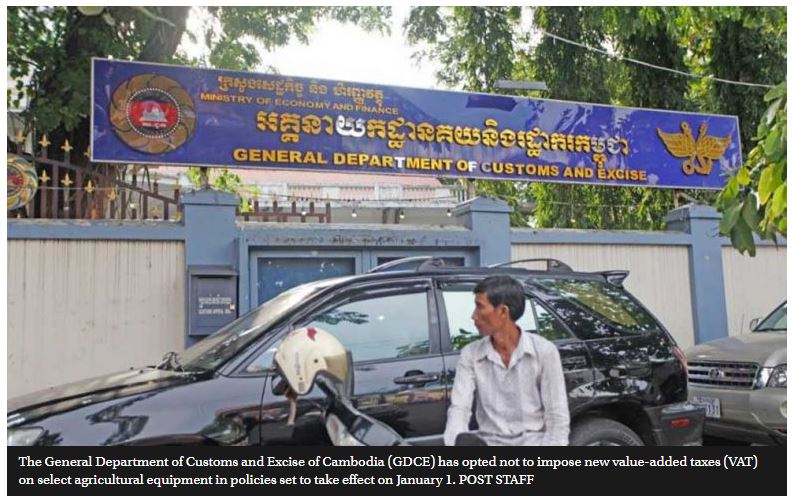Cambodia: Prolonged VAT exemptions to benefit farmers
As revenues have soared, the General Department of Customs and Excise of Cambodia (GDCE) has opted not to impose new value-added taxes (VAT) on select agricultural equipment in policies set to take effect on January 1, next year.
According to the GDCE’s announcement, signed by director-general Kun Nhem on October 13, the government will not levy VAT on motorised water pumps with a flow capacity up to 8,000 cubic metres per hour.
Larger types of industrial pumps are still subject to obligations and taxes according to the provisions in force, with exceptions granted by the GDCE for certain projects aimed at agricultural sector usage.
The GDCE defines VAT as a tax on goods or services supplied locally and levied on end users at a rate of 10 per cent in Cambodia.
Hun Lak, director of milled-rice exporter Mekong Oryza Trading Co Ltd, said placement of VAT under burden of the state on imported water pump machinery contributes to reducing farmers’ production costs.
But he pointed out that it does not quite make them as competitive as their counterparts in neighbouring countries.
“If the government optimises VAT exemptions, it will help lower production costs and make it easier to compete in milled-rice export markets.
“We know that our neighbours, Thailand and Vietnam, boast lower costs of rice production and processing than in Cambodia,” Lak said.
For Lun Yeng, secretary-general of the Cambodia Rice Federation (CRF), this type of tax exemption will benefit farmers because most use water pumps to irrigate rice fields.
“If importers do not have to pay VAT, they can sell at a cheaper price, which enables farmers to afford the equipment they need,” he said.
At an annual meeting in February this year, Kun Nhem said the GDCE collected more than $3.21 billion last year, an increase of 30 per cent over 2018.
He noted that revenue collected in major taxes categories saw remarkably high growth, with import duties up 30.7 per cent, special taxes up 33.6 per cent and VAT collections rising 28.8 per cent.
By type of goods, vehicles and machinery continued to be primary sources of tax receipts, accounting for 52.7 per cent of total revenue.
“Revenues collected last year were the highest in the last 20 years. This has occurred in a context where preferential tariffs, both in terms of investment incentives and for priority sectors, as well as the implementation of free trade agreements, are steadily increasing year by year,” he said.
Source: https://www.phnompenhpost.com/business/prolonged-vat-exemptions-benefit-farmers


 English
English




